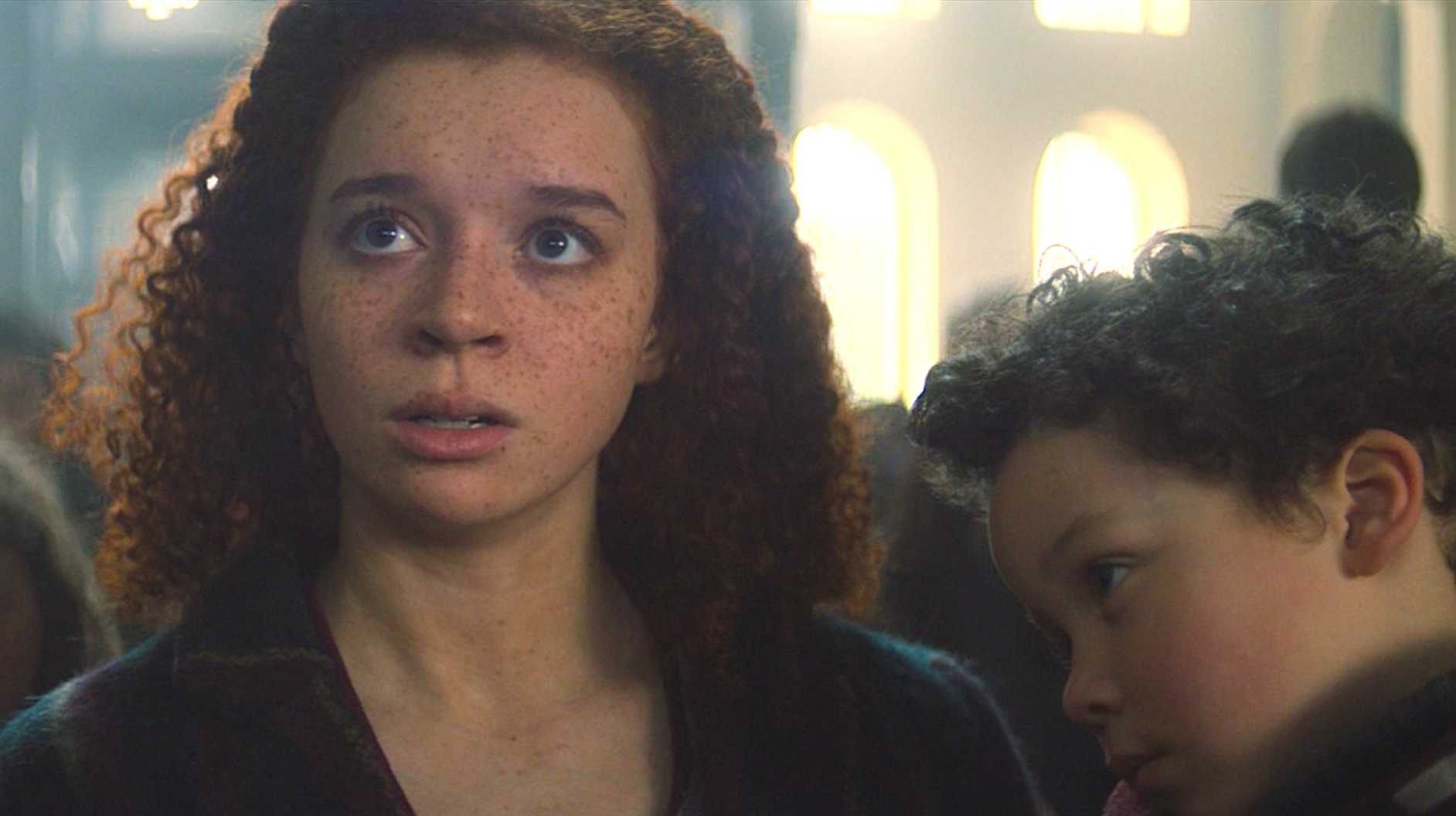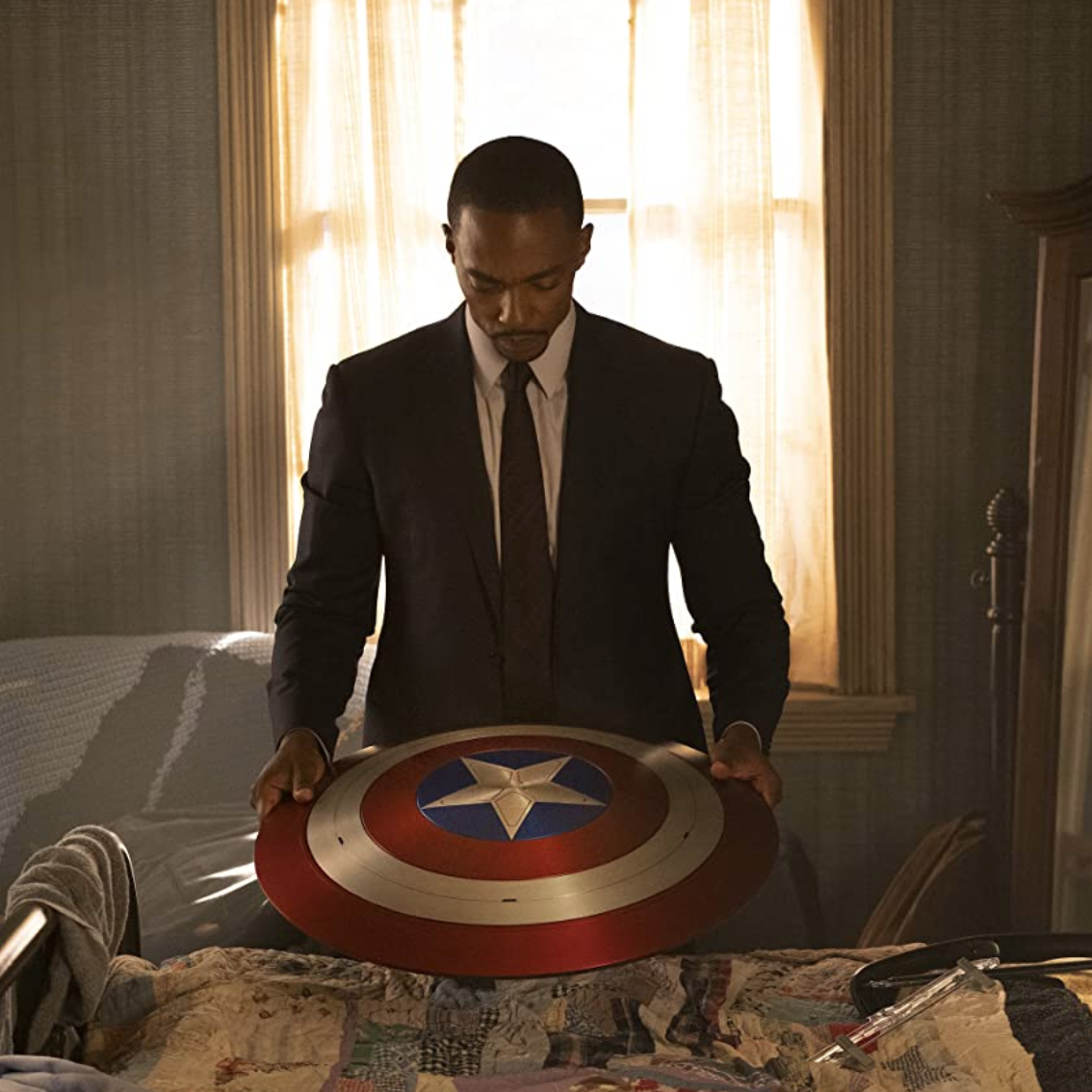Marvel’s The Falcon and the Winter Soldier brings together perhaps two of the most sensible villains in the MCU—Zemo, who builds on the principle that absolute Power corrupts absolutely (unless you’re Steve Rogers) and thus those with absolute Power must be destroyed—and Karli Morgenthau (Erin Kellyman), an advocate for internationally-displaced persons who believes … governments should practice human rights? Like we said: they’re reasonable people.
The tension at the heart of The Falcon and the Winter Soldier, in fact, plays out not between its “heroes,” but between these two “villains.” The fundamental question of the series thus far: Who do you agree with—Karli or Zemo? Hear us out.
Obviously, Karli has done some “evil” stuff. (Evil stuff list: She’s killed three people, and … that’s about it. As far as Marvel villains go, that’s some petty crime). Her “evilness” presupposes a model of behavior wherein all violence is illegitimate violence, where all violence is unethical. Karli doesn’t believe that this is the case. Karli believes that some Power must be exercised to defeat Power, even if that means practicing violence. It’s a bold position, but not one that’s totally inconsistent. In fact, Karli may be one of the most morally consistent characters since Steve Rogers. Violence or no violence, Karli kind of has a point.
From what we’re made to understand, life before the Blip—when half the world’s population returned—seems to have been better for the world’s inhabitants (trauma and loss aside). Which seems like a retroactive argument in favor of Thanos’ plan. Which is kind of messed up. Of course, Karli’s point seems to be less We Should Kill Everyone Again, and more We Should Continue to Live as If Half the World Was Still Gone, i.e., we should work to create societies which offer equitable employment, housing, and movement for all. (A world at half capacity had somehow made this possible.) The only dilemma for Karli is how to go about doing this. She choses to employ Power and violence.
For Zemo, there is no justification for the use of Power. Power must be destroyed anywhere it appears, because it necessarily corrupts; it turns all into supremacists.
So how does one act? How can you stop corrupt Power—either employed by the state or by a Super Soldier? In this dilemma, The Falcon and the Winter Solider rehashes arguments the MCU has been juggling since an imprisoned Tony built his arc reactor.
Like Karli, other Marvel characters favor utilitarian approaches to combatting perceived evils. Bucky argues for these practices in episode 4—that freeing Zemo, despite his crimes, is simply a means to an end. Others draw lines in the sand. Steve Rogers’ common dictum (and, ultimately, Wilson’s)—we do not trade lives—is not a dissimilar model from Zemo’s—we cannot trust superheroes. Both set forth personal laws, or maxims.
(Well, you say, didn’t Zemo technically murder non-power players in order to further his goal in Civil War? Yes, Zemo is what the ethicists might call… inconsistent. It’s perhaps the main reason why his character isn’t totally redeemable; Wakanda understands this.)
It’s all a bit Intro to Normative Ethics, but it seems to be the fundamental quandary across MCU films. In the language of superheroes, this quandary can be thought of as simply: How should Power be exercised? And this question is, of course, related to another common comic book dilemma: What is the responsibility of those who wield Power? And: To whom (or what) are those with Power responsible? (That last question is the basic disagreement in Captain America: Civil War—whether Power ought to be controlled by the state or by an independent body.)
In The Falcon and the Winter Soldier, we get these questions all over again—whether to obey or deviate from U.S. military prerogatives, whether to work with “villains” or not, whether to use or destroy the Super Soldier Serum, whether to seek legal mechanisms for political dissent or use illegal violence against the state. Those asking these questions are those with Power, literally, those with superpowers. And the person doling out that Power—by means of the Super Soldier Serum—is literally called the “Power Broker.” (Did we mention this series is all about Power?)
But, again, unlike in previous films where the struggle was internal to the Avengers (the “heroes”), The Falcon and the Winter Soldier positions the debate between the “villains”—or, at least, it has two villainous characters articulating moral questions usually reserved for the MCU’s protagonists. The fundamental question of the series thus far: Who do you agree with—Karli or Zemo? Is Power a necessary means? Or should all forms of Power to be destroyed?
The Captain America franchise often pairs characters who have opposing ethical models: Falcon and Bucky, Rogers and Bucky, Rogers and Tony, Wilson and Zemo, Karli and Zemo, Karli and Wilson. The suggestion seems to be that—while making the character dynamic more interesting—there’s somehow value to allies being somewhat at odds. It keeps each character balanced.
The only pairing that seems to reinforce each other’s models is John Walker and Lemar Hoskins/Battlestar, who both believe that taking the soldier serum would ultimately be beneficial—that they should save lives at any cost. This is also the relationship that ends with the most destructive version of Power thus far: Walker’s. Unlike Karli, Walker has no real goal. He seeks Power for its own sake. He seeks Power because he feels powerless.
Walker is a living justification for Zemo’s argument against Power. Walker proves Zemo right. But there is also an individual who proves Zemo wrong: Steve Rogers. Battlestar suggests that the Super Soldier Serum simply makes you more of what you already are; if you are a good person, the Serum cannot corrupt you. Therefore, Power does not necessarily corrupt. Between using Power to justify one’s ends and destroying Power completely, there is a middle path; using a Power, which doesn’t corrupt, for an end that is not also Power. The logic here is a bit tricky, but this middle path is the promise of the superhero. It’s about wielding the Power of the state while still being independent from that state. It’s about being a Captain America who doesn’t answer to America but the beating of his own righteous heart. (And, it’s worth noting, the symbol of Captain’s power—the shield—is always a symbol of protection and never aggression.)
The character literally standing between Karli and Zemo? Sam Wilson. It’s obvious why Wilson disagrees with Karli’s means, even if he agrees with her ends. Yes, Karli is right in that her ends are just. But she cannot yet see how to reach those ends without using violence. And just like Rogers, Wilson cannot allow for the taking of lives—no matter the ends. But it’s also obvious why he disagrees with Zemo; at the end of the day, like Karli, he believes Power can be a force for good. It should not simply be destroyed.
Zemo even concedes that in the case of Rogers, this exception was true—but Rogers is gone. The only option is for someone to become Steve Rogers. And isn’t that what the entire series has been anticipating? Rogers did choose Wilson for a reason, after all. It’s time for Power to be wielded right. It’s time for Wilson to take the shield.
This content is created and maintained by a third party, and imported onto this page to help users provide their email addresses. You may be able to find more information about this and similar content at piano.io



